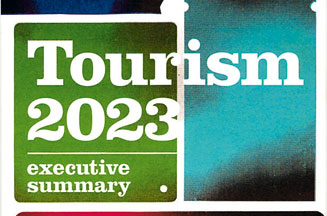
The travel industry has been one of the sectors hit hardest by the recession. However, that has not stopped it gathering at its annual conference with a view to facing up to the challenges that lie ahead, particularly those related to
the environment.
This year's Travel Convention in Barcelona, hosted by the Association of British Travel Agents (ABTA), featured several announcements on how the industry plans to tackle its current malaise. First was the unveiling of an industry-wide sustainability strategy, which will aim to improve consumers' perception of tourism and its environmental impact. Entitled Tourism 2023, it will be led by big brands such as British Airways, TUI, Thomas Cook and Co-operative Travel in conjunction with the government and charitable organisation Forum for the Future.
After years of inertia, the rush toward innovation and an increasing acceptance of sustainability issues mark a positive step. However, there appears to be a lack of definite goals from those running Tourism 2023, other than the aim to match the World Travel and Tourism Council's pledge to reduce the travel industry's CO2 emissions globally by 50% before 2035.
Five years ago, the announcement may have seemed radical, but a
series of loosely formed ambitions, including being ‘as energy efficient as possible' and ‘[using] more and more sustainable renewable sources of energy', may not be enough to convince the public of the sector's commitment to reform. Indeed, Virgin Atlantic, which has instigated a series of green schemes, including the aviation industry project Flying Matters, remains unconvinced by Tourism 2023 and has opted to focus on its own ‘high-profile and important tourism projects'.
A spokeswoman for Forum for the Future, which will oversee the development of Tourism 2023, says more concrete plans will be unveiled early next year. She adds that marketing may be one of the first areas to undergo change, with the partner brands creating a blueprint for communicating the benefits of sustainable tourism.
Much, it would seem, depends on how many travel businesses subsequently sign up to Tourism 2023.
Elsewhere, the travel industry's problems continue to accumulate. The much-maligned Air Passenger Duty (APD) - a crude banded method by which journeys are taxed according to distance - is to undergo successive hikes, first in November and then at the end of next year.
By December 2010, a family of four will pay an additional £600 in APD to fly premium economy class to Barbados. Despite campaigning by ABTA and direct lobbying by Caribbean governments to scrap the second rise in APD, the industry has failed to exert any influence over the government.
Problem of protection
ABTA is also struggling to quell discontent on the subject of protection, a hot topic in the industry following
the failure last year of travel company XL. Many tour operators are openly critical of the Protection Contribution - currently £2.50 per passenger - administered by Air Travel Organisers' Licensing (ATOL).
Mark Tanzer, chief executive of ABTA, announced at the convention that talks were in progress with the Civil Aviation Authority to extend the protection scheme from package holidays to trips where consumers buy their flights and accommodation separately.
However, Richard Carrick, chief executive of Hoseasons, claims there is no quick fix to the industry's problems. ‘Every day one of the major overseas operators says things are going to return to normal in 2010. Frankly, much of this is at best naive and, at worst, self-serving and unsubstantiated,' he adds.
For all the enthusiasm of delegates, and high hopes of an improved economy next year, the travel industry cannot afford to underestimate the challenges that await it.

